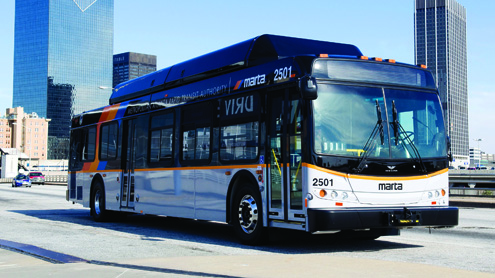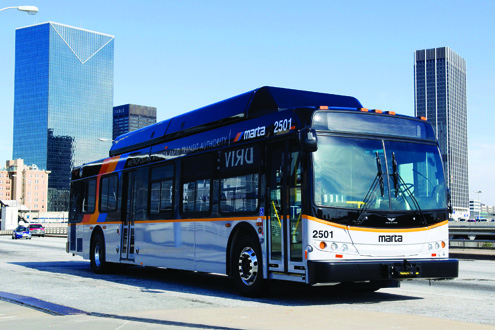
Despite the recession, Atlanta transit makes strides to improve service
By Dr. Beverly A. Scott
MARTA GM/CEO Manager
In the wake of the economic recession, the Metropolitan Atlanta Rapid Transit Authority (MARTA) and transit systems throughout the country have endured significant service cuts, staff reductions and fewer available resources which have forced us all to evaluate how to provide the highest quality transit service during lean financial times. While we face with what seem like insurmountable odds given the ongoing financial downturn, transit professionals have risen to the challenge, leveraging the creativity and talents of employees and engaging our customers and community stakeholders to maintain safe, reliable and courteous transit service.
At MARTA, the economic crisis has certainly taken its toll. We’ve weathered a sharp and sustained decline in our sales tax receipts – our largest source of revenue – forcing us to raise fares twice over the past four years and reduce our bus network from 131 to 91 routes. We were extremely disappointed to have to make these changes and recognized the devastating impact to our customers.
In response, the MARTA team has identified ways to direct our limited resources toward maintaining and improving quality service to our customers. Staff focused on how we could address areas that were significantly important to our customers including on-time performance, service reliability and customer service. We also continued to work hand-in-hand with customers to gather input and respond accordingly whenever possible.
As part of the bus service reductions, we recognized that consistent and careful analysis and feedback from customers were critical to ensuring that routes performed on schedule. Our Planning, Communications & External Affairs and Bus Operations Departments joined together to create the Service Improvement Team (SIT), charged exclusively with enhancing system-wide and individual bus route performance.
This team analyzes the worst-performing routes and identifies the key factors that contribute to diminished on-time performance including traffic congestion, heavy passenger boarding, equipment problems, lengthy routes and running time allocation. Corrective actions are taken to fine tune routes, modify route alignments and adjust running times, trip times and headways. In consultation with customers, 55 service adjustments have recently been implemented to better facilitate on-time performance. Overall, thanks to diligent work by these departments, MARTA’s bus on-time performance has risen from 66 percent in FY 2008 to 74.3 percent in FY 2012.

That’s a 12.7 percent improvement since the economic downturn began.
On the maintenance front, we have zeroed in on innovative ways to preserve the performance of our bus fleet and improve overall reliability. Using our Maintenance Management Information System (MMIS), we are better able to detect and correct patterns of failure fleet-wide by clearly communicating inspection instructions and performance expectations while using the highest quality parts available. In addition, we’ve focused on finding patterns of failure in components and systems in specific fleets and have engaged our engineers and inspectors to address these issues. Through these efforts, we’ve increased our Mean Distance Between Failures (MDBF) by almost 60 percent from Fiscal Year 2008 to 2011.
Finally, MARTA continues to improve the transit experience by providing excellent customer service. In another interdepartmental effort, the Training and Bus Operations teams have combined their expertise to roll out a Customer Service Impact (CSI) training program that offers operators communication skills and tools to achieve excellence in service delivery. Operators are provided with guidelines on how to work with customers to diffuse difficult situations and achieve resolutions.
The program also establishes clear lines of accountability. Once operators complete the training, they start with a clean slate on their customer service records. At the same time, new guidelines hold operators accountable for their actions. Customer complaints are often deemed non-valid due to a lack of objective evidence. This initiative establishes that the fourth non-valid customer complaint an operator receives may be deemed valid due to the fact that it indicates a pattern of behavior.
As a direct result of our team’s ongoing commitment to providing excellent customer service, bus complaints per 100,000 boardings have been reduced by 51.5 percent since 2008.
While the severe economic downturn has significantly impacted how we do business, it has also reminded us that we can still do great work with very limited resources. As we move forward toward what we hope are better financial times for transit, we must continue to apply the lessons we’ve learned during these difficult years. By working together, leveraging the talents of our staff, communicating regularly with employees and customers and maintaining an unwavering commitment to excellence, we can always find ways to maintain high-quality transit service to our communities. BR
Dr. Beverly A. Scott is the general manager and CEO of the Metropolitan Atlanta Rapid Transit Authority.


Dr. Scott, I just read your article and thought that you might be interested in hearing about the success one of our customers have had working with bus companies in the Philippines. I know that all businesses no matter their size have to reduce costs and still maintain and improve quality service to their customers, Battery Chem can help you do just this!
This is the letter we received Dr. Scott, if you are interested to know more, please contact me for more information.
Dear Walt / Susan – I live in a tropical climate and have been working with BatteryChem to service large bus batteries. Where the average year-round temperature is 85-90 degrees F and 85-90% humidity, battery service life in these buses is typically measured in months rather than years.
These are batteries which cost $200-$250 each and there are two batteries per bus. Their average life span is 8 to 10 months and, occasionally, up to 1 year. BatteryChem has proven extraordinarily successful in treating these batteries. If the batteries pass all 3 initial tests for eligibility, they always respond well to the product and typically provide another full service life of 8 months to one year.
These are batteries which have been pulled from the scrap pile, treated and slow-charged for 48 hours. Based on the success of BatteryChem with scrap batteries, my customers have begun adding the product to new batteries to slow down the sulfation process before it begins
.
On behalf of myself and my customers, thank you for developing and marketing BatteryChem.
Sincerely,
Scott D.